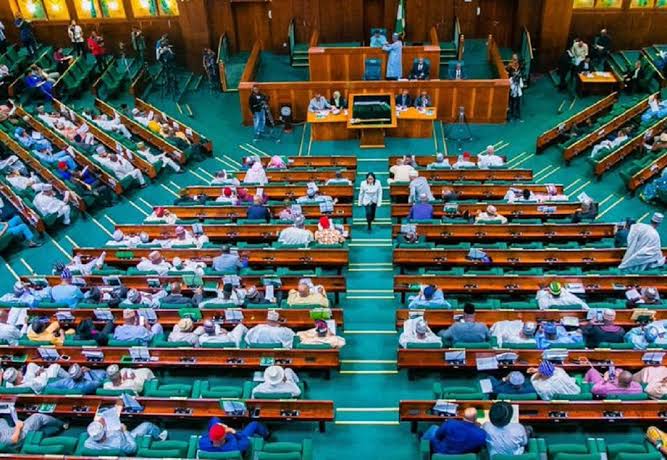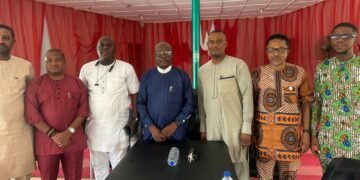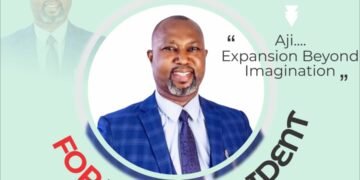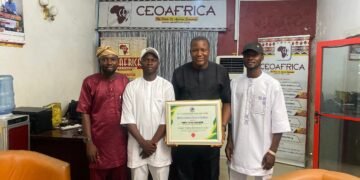Nigeria’s House of Representatives will this week resume from its four-week recess. The House of Representatives had on Saturday, December 30, 2023, proceeded on a break to allow representatives deepen constituency outreach and spend the end-of-year festivities with constituents.
This followed the passage of the 2024 Appropriation Bill (now Act) at a special session held to consider and adopt the report of the Rep. Abubakar Kabir Abubakar-led House Committee on Appropriation. H.E. President Bola Ahmed Tinubu had presented the budget proposal before parliament on November 29, 2023. The 2024 Budget totaling N28,777,404,072,861 was signed into law by Mr. President on January 1, 2024.
Themed ‘Budget of Renewed Hope;’ it is the first substantive appropriation considered and passed by the Tenth House of Representatives since inauguration, and it focuses on job-rich economic growth, human security, and macro-economic stability.
Following its inauguration in June 2023, the House of Representatives has recorded significant legislative outputs over the first half of its first legislative year (June 2023 – June 2024), The House made significant strides in fostering greater collaboration with citizens in key legislative activities. Shortly after inauguration, a Citizens’ Town Hall was held on July 25, 2023 to receive public input in the Legislative Agenda. Similar town halls were held on November 28, 2023, and on December 4, 2023, to harness public input in the proposed amendment of the Electoral Act 2022 and the 2024 Budget Proposal, respectively.
On November 21, 2023, the Sectoral Debates Series was successfully introduced for the Green Chamber to engage the Ministries, Departments and Agencies (MDAs) of government and better understand their unique challenges. The House also reviewed its Standing Orders to incorporate technological advancements such as E-Parliament to better adapt to changing needs, and in line with international standards and best practices.
Highly responsive and committed to ameliorating the suffering of constituents, and contributing to Nigeria’s overall peace and development, the House considered 500 Motions on pressing matters affecting the people. However, one key achievement of the House that must be highlighted is the unveiling of an eight-point Legislative Agenda on November 14, 2023, which outlines clear and specific objectives to be achieved in the life of the Tenth Assembly.
Previous assemblies have had legislative agendas, but the Rt. Hon. Abbas Tajudeen-led 10th House has raised the bar with key priorities, including: i) Strengthening Good Governance, ii) Improving National Security, iii) Law reforms, iv) Economic Growth and Development, v) Social Sector Reforms and Development, vi) Inclusion and Open parliament, vii) Influencing Foreign Policy, and viii) Climate Change and Environmental Sustainability.
Key attributes of this Agenda of ‘The People’s House’ indicate a huge improvement on this ethical framework set by previous Assemblies. These include:
1. Far-reaching consultations that informed its priorities and public input through representatives of Ministries, Departments and Agencies (MDAs), Civil Society Organizations (CSOs), Development Partners, and other relevant stakeholders.
2. Modes of monitoring and evaluating progress which includes the constitution of a Standing Committee for this purpose.
3. Codification into a public document (hard and digital forms) to enhance accessibility and accountability.
4. Careful alignment with the 8-Point Agenda of the Executive to ensure policy consistency and coherence.
5. Implementation strategy which is divided into short, medium and long term goals stands it out from previous efforts.
As part of efforts towards the achievement of its strengthening good governance priority, the House outlined the initiation of legal reforms to address systemic human right issues among the medium term goals for 2024-2025. In line with this, the House passed the Administration of Criminal Justice Act (Repeal and Enactment) Bill, 2023.
This is in addition to enhanced collaboration with national and international institutions as well as development partners in the areas of Town Halls held so far, and other strategic areas. All of these efforts are targeted at strengthening the various Committees of the House to enhance their oversight functions and improving the National Assembly’s delivery.
Remarkably, in just 6 months, many other short and even medium term goals as outlined in “The People’s House Legislative Agenda” have been achieved. Thus, looking forward, as the House resumes full legislative business this Tuesday, the following issues re expected to frame legislative proceedings and deliberations, and define the second half of the first legislative year (June 2023 – June 2024). These are:
1. *Security*: The country is currently experiencing rising security challenges in the form of kidnapping, banditry, and other criminal activities. Even Abuja, the federal capital territory, has not been left out, and has witnessed the abduction and murder of innocent citizens. The Plateau Crisis which elicited a statement from Mr. Speaker, amongst other security issues in the country, continues to put these issues on the front burner. Expectations are rife that the People’s House will take bold steps in addressing insecurity from a legislative standpoint.
2. *Constitution Amendment*: There have been increased calls from stakeholders, on the need for the National Assembly to cure the 1999 Constitution of its perceived defects. The efforts of previous assemblies which have resulted in five alterations to the document between 2003 and 2023, is widely considered inadequate. Agitations for amendments to key areas have intensified, including calls for the establishment of state and community-led police structures; justice sector reforms; fiscal federalism; strengthening local government administration and increased devolution of power; e.t.c. As the House resumes, Nigerians would be looking to the Rt. Benjamin Kalu-led House Committee on Constitution Review to make progress in the efforts for further amendments to the 1999 constitution (as amended).
3. *Electoral Reforms*: As preparations intensify for the off-cycle elections in some states of the federation in the second half of 2024, the calls for electoral reforms will continue to dominate conversations in the country. Nigerians will be looking to the National Assembly for key reforms of the electoral process as we promised in our legislative agenda, to, amongst other things, improve the transparency and credibility of democratic ritual of elections, provide for stiff sanctions for electoral offences, and stem the judiciary’s influence on the electoral process, and ‘over-judicialisation’ of electoral outcomes in a way that undermines public confidence, and could erode the legitimacy of political leadership.
4. *Legislative Oversight*: In line with the commitment to Anti-Corruption and Improved Legislative Oversight under its Agenda One: Strengthening Good Governance, the House streamlined the mandates of committees to avoid overlap and conflicts. It also rationalised the Membership of committees to enable more informed decision-making, better management of workload, and improved legislative quality.
On resumption, the House is expected to undertake more public hearings (including investigative panels) to probe a number of issues before the various Standing Committees. Between June and December 2023, the House constituted 30 ad-hoc Committees to conduct investigative hearings and make recommendations on pressing national issues for necessary legislative action. With the reports of 25 already submitted and four considered, the reports of the other Committees will occupy the front burner on resumption.
5. *Public Petitions*: The House since inauguration has received a hundred and fifty-three (153) petitions from various citizens across the country which are receiving necessary legislative actions. The Rep. Mike Etaba-led House Committee on Public Petitions has quietly achieved commendable success in helping Nigerians get succor from the People’s House. The outcome of hearings on one of these petitions resulted in the payment of a compensation package amounting to Thirty Million Naira (N30,000,000) for Citizen Tairu Quadri Adewale; an Amputee Electricity Worker neglected for 15 years. Notably, the House of Representatives on Tuesday, December 5 2023, facilitated the presentation of the sum as a Final Settlement of Liability Claims Cheque to him by the Nigerian Electricity Liability Management Company (NELMCO) management.
Quadri; a 400-Level Electrical Engineering intern from the Olabisi Onabanjo University, Ago-Iwoye, Ogun State, had suffered electrocution in May 2008 while on duty for the defunct Power Holding Company of Nigeria (PHCN) in Lagos. The House through its Committee on Public Petitions will be engaged in facilitating more of such settlements as well as the resolution of more issues arising from petitions already submitted for its consideration. Similarly, more petitions from distressed citizens will be laid before parliament.
6. *Bills Progression*: In its first six months, the House received 962 bills, out of which 120 have passed Second Reading and are currently undergoing in-depth analysis at the Committee stage. These bills are intended to provide immediate relief and long-term solutions to the challenges that have plagued our society. With the resumption of the House, reports on a majority of these bills will be laid before parliament for consideration and adoption ahead of third reading and passage.
More bills are expected to move through the various parliamentary stages and be presented for the President’s assent. Through these bills, citizens will be better empowered, while peace, security and social justice will be enhanced.
7. *State of the Economy*: In spite of major efforts by the Federal Government to boost economic growth, a lot still needs to be done to ameliorate the pains felt by constituents across the country. The House will continue to support the Executive arm of government in the implementation of the ‘Renewed Hope Agenda’, and hold entities of the executive arm of government accountable. Efforts in these regards will include ensuring efficient and effective deployment of public resources especially through the use of hearings and oversight visits. The House will also enhance the Sectoral Debates started in November 2023, to promote transparency and accountability in government operations in line with our Legislative Agenda.
8. *Constituency Outreach*: With the 2024 budget now in place, supervision of the implementation of the budget will occupy a prominent place in the activities of Honourable Members. As part of the representative function of lawmakers, Honourable Members are primarily involved in influencing and facilitating projects and programmes in their respective constituencies. Honourable Members are thus expected to also be occupied with more robust constituency outreaches, and supervising effective delivery of these initiatives for the benefit of our constituents.
9. *Influencing Foreign Policy*: Last but not least, in line with the legislative agenda, the House is expected to take key legislative actions on key foreign policy imperatives, including the need to address the current impasse in the ECOWAS region. This is because peace and stability in the region has implications on our domestic affairs.
Year 2024 holds a lot of promise for the country’s future and it is imperative for all hands to move our country forward. Nation building is a Joint Task, and the 10th Assembly is set with renewed vigor, to continue to play our own part in rebuilding our great country, Nigeria.
*Rep. Akin Rotimi, Jr.*
Monday, January 29, 2024
_Rotimi is the House Spokesman and Chairman, House Committee on Media and Public Affairs._













